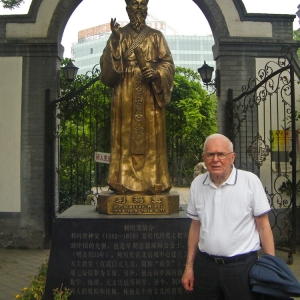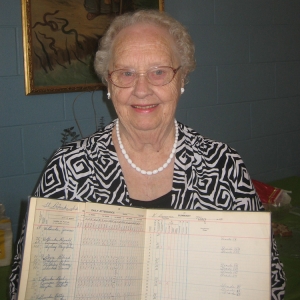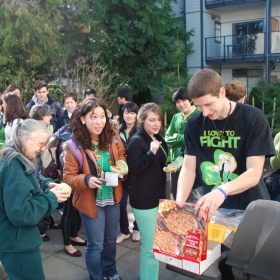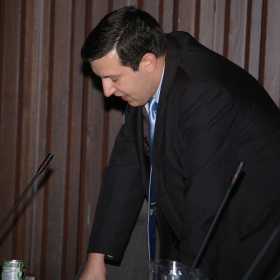On a recent lecture tour around the world, I experienced the universality of the Catholic Church in the local culture through the sacred mystery of the Eucharist. On four successive Sundays attending Mass in Beijing, New Delhi, Stockholm and London, I felt a unity with people I did not know, infused by liturgy that embraces us all. How different in each locale; how the same. Christ, I realized anew, binds us all wherever we are in the world.
The first Sunday, I attended the Cathedral of the Immaculate Conception, the oldest Catholic church in Beijing. It was first erected in the middle of the 16th century and has twice been rebuilt. Shut down during the Chinese Cultural Revolution of the 1970s, the church is now in good repair. Though the Mass in English attracted foreign visitors, there were many Chinese present. Most Masses are, in fact, in Chinese.
Standing guard outside the cathedral was a bronze statue of Matteo Ricci, the Italian Jesuit scientist who was one of the first Catholic missionaries to China. He arrived there in 1582 and became famous for his mastery of Chinese language, his erudition and adaptation of Chinese customs. He explained the Catholic faith not as something foreign but as the most perfect manifestation of the existing faith of the Chinese people, who believed in “the Lord of Heaven.”
Start of the school year brings back memories of one-room schoolhouse
By Lorraine O'Donnell Williams, Catholic Register SpecialKEARNEY, ONT. - With the start of a new school year, the sight of school buses picking up students in the small (pop. 837) town of Kearney, Ont., brings back precious memories to retired Catholic teacher Dolores White.
White, now 82, is among a dwindling group of Ontario educators who taught in one-room schoolhouses. She recalls fondly the days of teaching Grades 1-8 in a classroom of up to 30 students.
One-room schoolhouses were once common in Northern Ontario. Some were housed in railway cars — a school on wheels — that would travel between communities. Part of the train was the classroom, the other the travelling teacher’s residence.
White’s teaching space was more stable. She taught in a large room, complete with desks, blackboards and heating, that had been the original St. Patrick’s Catholic pioneer church. In 1910 the church became the Kearney Separate School. Kearney is about 250 km north of Toronto.
“I had to be well organized to make sure I covered the curriculum for each grade,” said White. She also relied on student tutors. “If I was busy teaching someone, and someone else needed help, I’d tell them, ‘Take your work to one of the older classmates.’ And the older ones responded.”
To counter the partying that goes hand-in-hand with FROSH week at post-secondary institutions, campus chaplaincies offer students something a little different.
At King's University College at the University of Western Ontario, the campus chaplaincy will be holding a prayer service to welcome students back to school.
"It's a prayer service instead of Mass because we want it to be inclusive for all our students who may not be Catholic," said campus minister Sr. Susan Glaab.
The service will involve some quiet reflection, some Taizé prayer, singing and sharing in small groups, said Glaab.
Campus chaplaincy will also be there on Labour Day as an unofficial welcoming committee, as the students move into residence, to answer any last-minute questions and offer support to both students and parents, she said. Glaab said it's important for campus chaplaincies to hold FROSH events — particularly when they're affiliated with a larger university — so students know there's a place they can go on campus for support, space and some much-needed quiet.
"It's very important because during FROSH week they're just bombarded with everything and, for a lot of students, that can be an overwhelming experience," said Glaab. "Some adapt to it right away but others need more balance in their lives… so we're there to offer that and promote our Catholicity."
TORONTO - At a raucous meeting to amend its equity policy, the Toronto Catholic District School Board passed a resolution that affirms denominational rights will take precedence when there is a conflict with government policy.
The Aug. 31 meeting was intended to be the final leg in an emotional ride in the board's efforts to hammer out a policy to come onside with the provincially mandated equity policy. Each board in Ontario was to have its policy in place by Sept. 1.
The board voted on a series of amendments from trustees John Del Grande and Angela Kennedy during the stormy four-hour meeting. In the end, the board voted to accept one amendment and passed watered-down versions of the others. One other amendment was put off to be dealt with at a future meeting. Emotions ran high during the meeting attended by more than 120 people, many of whom favoured the unequivocal language of Del Grande's amendments that asserted Catholic denominational rights in education. There were loud outbursts when the majority of the Del Grande-Kennedy amendments were defeated and replaced by amendments with less-stringent language. The temporary commotion led to TCDSB chair Ann Andrachuk calling a five-minute recess.
This reaction was in contrast to the loud applause that greeted the passing of Del Grande's amendment, which read: "When there is an apparent conflict between denominational rights and other rights, the board will favour the protection of the denominational rights." However, the board also said it would leave it to courts to determine any conflict of rights.
 TORONTO - A team from Blessed Mother Teresa Catholic Secondary School in Scarborough recently won the top prize at this year’s National Society of Black Engineers (NSBE) Design Competition in Rochester, N.Y.
TORONTO - A team from Blessed Mother Teresa Catholic Secondary School in Scarborough recently won the top prize at this year’s National Society of Black Engineers (NSBE) Design Competition in Rochester, N.Y. Beating out 10 other teams from New York State, the all-girls robotics team designed and built a robot which had to pick up as many white cans as possible from their field positions on an obstacle course and place them in the “finish box” within a three-minute period. “We were the only team competing from Canada,” said Mary Charles Hills, one of the team’s teacher advisors.
 Mississauga. ont. - It’s become a daily morning routine for five-year-old Theresa Rebello. The third youngest of 10 children, Theresa helps her two-year-old brother Luke get ready to go to Mass with her mom and the younger kids while her older siblings head off to school with dad.
Mississauga. ont. - It’s become a daily morning routine for five-year-old Theresa Rebello. The third youngest of 10 children, Theresa helps her two-year-old brother Luke get ready to go to Mass with her mom and the younger kids while her older siblings head off to school with dad.In the Rebello family, learning the faith starts early.
“With parenting, (we asked ourselves) what is our goal 20 years from now?” said Theresa’s mother, 38-year-old Liz Rebello of Toronto. “We always have that end. This is what I want them to be. We want them to be free and responsible adults with a good moral upbringing.”
Teaching kids about faith and values is what’s missing in a much-talked-about memoir by Yale University law professor Amy Chua. In a new book, Battle Hymn of a Mother Tiger, Chua writes about her “Chinese style of parenting” that has produced two over-achieving daughters. Chua explains how her kids live by stringent rules: no sleepovers, school plays or getting a grade less than an A, a style she says encouraged her children to excel.
 Everyone who reads has at some time or other been psychologically kidnapped by a book. A great book carries us away. They are populated with friends, allies, enemies, protectors and persecutors. Great books teach us how to fall in love, answer when challenged, hope when hopes are dashed, cry when we are hurt and laugh for the sake of laughter.
Everyone who reads has at some time or other been psychologically kidnapped by a book. A great book carries us away. They are populated with friends, allies, enemies, protectors and persecutors. Great books teach us how to fall in love, answer when challenged, hope when hopes are dashed, cry when we are hurt and laugh for the sake of laughter.Few of us would honestly name the Bible as a psychological surround sound experience. For most, it’s hard to immerse ourselves in the world of the Bible.
I recently began a new journey into the Bible’s gated and guarded world when I received a Kobo Reader for Christmas.
A Kobo Reader is a simple electronic device that connects to the Internet and lets you download books that can be read on a small screen. There are thousands of books to choose from and I started with the oldest of them all, the Bible.
For many good reasons, the Bible isn’t a book that sweeps us away. First, it isn’t a book. It’s a collection of books assembled 1,700 years ago from literature that dates as far back as 1,200 B.C. The books of the Bible were written in either Hebrew or Greek, and some were written about people who spoke other, equally distant languages, including Aramaic, the language of Jesus.
 TORONTO - Most basketball players have a conventional notion of what makes a great basketball photo. The great photos show a player rising above the rest — a hand blocking a shot, a rebound plucked out of mid-air, a shot launched with precision.
TORONTO - Most basketball players have a conventional notion of what makes a great basketball photo. The great photos show a player rising above the rest — a hand blocking a shot, a rebound plucked out of mid-air, a shot launched with precision.But those heroic moments aren’t how 5’9” centre Cesarine Moundele of the St. Joseph’s College School Rough Riders thinks of her sport or her team. When I asked the team what sort of picture would best tell the story of basketball at their school, Moundele said, “A picture of the bench.”
Teammates all around her agreed. What makes their team is all of them, together, cheering each other, supporting each other.
“We’re like family,” said 5’0” guard Christi-Ann Miole.
The Rough Rider’s improbable coach Francesco Maltifitano — who made his mark playing soccer, not basketball — turned away from the kids to hide his smile. He was as proud of this answer as he was of any of their wins.
Challenged to say why basketball should matter at all in a Catholic school, 5’4” guard Raize Dela Pena said, “You learn teamwork. You know you’re not alone in the world.”
D&P-funded program provides pro-life solution to Haiti's sexual violence
By Michael Swan, The Catholic Register
In the tent camps around Port-au-Prince, in the collapsed and desperate slums of Cite Soleil, amid the violence of a chaotic city policed by United Nations troops from around the world there’s a pro-life story.
Kay Famn (Creole for the House of Women) doesn’t call itself a pro-life organization. The Development and Peace partner proudly claims the title feminist. What Kay Famn does, however, lifts up women and the value of life in the face of violence and the most corrosive poverty in the Western Hemisphere.
Before the earthquake Kay Famn ran one of the only women’s shelters in Haiti — a country where until 2005 rape was considered a crime against honour rather than a crime against a person. Now with more than one million people crammed into tent camps where there are no locked doors and the shadows at night hide all kinds of crime, Kay Famn is seeing a steady stream of girls, many between 13 and 15, come to them pregnant.
“They arrive pregnant and give birth here,” Kay Famn co-ordinator Yolette Jeanty told The Catholic Register.
Somebody has to prepare the girls for motherhood.
“They’re kids we are preparing to give birth,” said Jeanty. “They don’t have families. They stay with other kids.”
The program is called Revive. In addition to dealing with the trauma of the girls’ situation — whether they’ve been raped, seduced by an older man or surprised to discover they are pregnant — Kay Famn tries to keep the girls in school or at least provide basic literacy and job training.
If not for Kay Famn, no end of illegal and dangerous abortions are performed in Haiti. Given the state of health care, the girls chances of surviving child birth without Kay Famn are low. Even before the earthquake, the maternal mortality ratio for Haiti was 670 for every 100,000 live births, according to Unicef.
The problem is bigger than Kay Famn can deal with. They’ve got room for about a dozen girls at a time. They can offer financial support for 40 girls. Out there in the camps there’s an epidemic of sexual violence and a kind of brutal economy in which sex is traded for protection, food and shelter.
All of that means there’s good reason to help Kay Famn with financing and strategy, said Development and Peace executive director Michael Casey.
“You look at that tragedy, that kind of thing happening to very young girls, the violence being perpetrated against women in the camps — the stuff that Kay Famn is working with,” he said.
“Those are very, very important stories.”
“There’s a lot of sexual violence against little girls and adolescents,” said Jeanty. “Men are using violence to bring girls to bed. Or trading rice for sex.”
Kay Famn does not advocate for abortion access because that won’t solve Haiti’s problem with sexual violence and predation. They do what they can for the girls who come to them.
“The situation in the camps has exacerbated the problem,” said Jeanty.
- RAISING UP HAITI -
a Catholic Register special report
Haiti's churches need healing [slideshow]
What now in Haiti?
Post-traumatic stress proves difficult
Catholic aid organizations fly under the radar
Canadian engineer to oversee Haiti’s Church rebuild
Haiti must take this opportunity to change
Crisis makes D&P rethink how it operates
Bold education plan held up by a lack of funds
Church holds community together
D&P-funded program provides pro-life solution to Haiti's sexual violence
Haitians must look to themselves to rebuild their nation

Madame Odessi Petit Foin knows exactly what she’s missing since the church in Duvale collapsed, along with her house and most of the other houses in the farming community.
Duvale always did need lots of things. It was never rich. It needed a new road before the earthquake and now it needs it more. It has needed a new school for a long time and thanks to the earthquake it got one — built with aid money on the foundations of the collapsed church. And it needs houses for the families still living in tents by their tiny plots of tomatoes, cucumbers and peas.
In Petit Foin’s opinion, Duvale also needs its church.
“It preaches morality and conversion,” she said.
She also makes the point that it’s through the church that Duvale gets access to the international aid money which will finance a new Caritas Port-au-Prince agricultural improvement project. But that’s not the most important reason that Duvale needs its church.
“The church in Duvale plays a very big role that holds together friends and family,” she said.
Petit Foin is not an economist, a politician, a theologian or philosopher. But as she stands in the old church hall, which has become the church in Duvale, she’s hit upon something quite important.
There’s more to infrastructure than the efficient delivery of goods to market on safe, smooth and broad roads. A community requires infrastructure so it can hold together, so it can know itself and meet the world. Duvale needs its church so that it can be a community which people recognize when they see the church.
The people of Duvale themselves need to recognize that they are a community of families when they meet for Sunday morning Mass.
There is such a thing as spiritual infrastructure. In fact, if Duvale had a great road connecting it with Port-au-Prince but its people had lost their way and no longer knew themselves, no longer cared for each other, no longer lived in and for their families — well, that would be a road to nowhere.
- RAISING UP HAITI -
a Catholic Register special report
Haiti's churches need healing [slideshow]
What now in Haiti?
Post-traumatic stress proves difficult
Catholic aid organizations fly under the radar
Canadian engineer to oversee Haiti’s Church rebuild
Haiti must take this opportunity to change
Crisis makes D&P rethink how it operates
Bold education plan held up by a lack of funds
Church holds community together
D&P-funded program provides pro-life solution to Haiti's sexual violence
Haitians must look to themselves to rebuild their nation
More...

For the first time in St. Antoine’s history the teachers are worried about their girls in Grade 6. Before the Jan. 12, 2010 earthquake 100 per cent of Pupils de St. Antoine students would pass state exams that qualify them to move on to Grade 7 and secondary school.
This year most of the girls are living in tents on the Champ de Mars. Before the earthquake there were 700 students, now there are 570. Many of the parents are having trouble coming up with $180 for school fees, to say nothing of books and uniforms. Development and Peace is helping by paying for hearty lunches of rice and beans with vegetables and meat. The girls are eating better than their parents.
The girls’ biggest handicap is the loss of their school building, according to school principal Sr. Sainte-Anne Jean-Baptiste. The old St. Antoine’s is a heap of rubble and the Sisters of St. Anne have no money to clear it and rebuild or to buy another site.
“The education we want to give children we can’t give right now. They need to progress — to go from one success to another,” said Jean-Baptiste. “It’s almost impossible to study in the tents.”
St. Antoine’s is borrowing the classrooms of Cole Marie Reine Immaculate. When that school lets out in the afternoon, St. Antoine’s moves in. But St. Antoine’s has no offices, no meeting rooms, no equipment, nothing but the classrooms — many of which are squares on the concrete courtyard walled off by sheets of plywood beneath a tin roof.
There are about 40 girls in every classroom. Their teachers also live in tents, though many are able to remain at the site of their old homes and thus are spared the crowded, fetid, cholera-breeding tent camps.
Veteran teacher Michelle Auguste believes in her students. “With education these girls will do anything,” she said.
Auguste isn’t talking out of pollyanna optimism. Her daughter went to St. Antoine’s and then high school at College Marie-Anne — both inner city Catholic schools whose students are mainly lower middle class and poor. She is now in second year at National Taiwan University studying physiotherapy.
Cecile Romiette Auguste speaks French, Creole, Spanish, English and Mandarin. She may pursue a Master’s degree after her undergraduate studies in Taiwan.
“Those who educated me in elementary school and high school, even if I might spend my life talking about them I don’t think I could ever describe to you half their worth,” the young Auguste wrote in an e-mail.
She visited home last summer and wept at the ruins of her old school.
“I believe strongly that a generation of women who graduated from St. Antoine can transform the fate of my country,” said Auguste.
Little of Haiti’s education system still stands. Eighty-nine per cent of the schools — including two universities in Port-au-Prince — were destroyed. The Haitian government has developed a $4.2 billion, five-year plan to cover education, but doesn’t have the money to implement it. Current government spending is around $80 million per year. The Inter-American Development Bank kicked in $50 million in November, and will contribute $250 million over five years.
The United Nations Development Program lists Haiti’s literacy rate at 62.1 per cent, but most observers think the real rate is just over 50 per cent. For Haiti to ever become a real, functioning democracy the literacy rate will have to rise significantly among the earthquake generation.
At Ecole Immaculee Conception Haiti’s future looks bright. The school yard is filled with happy, energetic girls rehearsing a dance for a school show. Annual fees are $500 and while these kids are not necessarily rich, they are less likely to be caught up in the tent camps than St. Antoine’s students.
Development and Peace has provided $350,000 to the Missionary Sisters of the Immaculate Conception to build the second storey of a two-storey school. As construction on the earthquake-proof school proceeds, classes are held under tents.
The Sisters have put their students and the school ahead of their own comfort. While the hill-top site is host to a busy construction crew laying bricks and mixing cement, the nine Sisters are living in four old classrooms in the old school. All the community’s possessions, from clothes to books, are piled in an old box car nearby. Every Sunday between 300 and 500 people gather in the open space where the rubble has been cleared to celebrate Mass with the Sisters.
Sr. Josette Drouinard would love the new building to have an auditorium and chapel but there are no funds. Meanwhile she is proud of the new school under construction.
“It will be a functional building, but with all the comforts,” she said.
- RAISING UP HAITI -
a Catholic Register special report
Haiti's churches need healing [slideshow]
What now in Haiti?
Post-traumatic stress proves difficult
Catholic aid organizations fly under the radar
Canadian engineer to oversee Haiti’s Church rebuild
Haiti must take this opportunity to change
Crisis makes D&P rethink how it operates
Bold education plan held up by a lack of funds
Church holds community together
D&P-funded program provides pro-life solution to Haiti's sexual violence
Haitians must look to themselves to rebuild their nation

In Duvale, an exhausting two-hour crawl by Toyota Land Cruiser from Port-au-Prince, the Caritas network is trying to pick up the pieces for local peasants.
Eighty per cent of the buildings in Duvale collapsed last Jan. 12, including the church. Port-au-Prince refugees from the earthquake wandered through the area in February and March and ate up all the seeds for the next crop. Even before the earthquake, farming in Duvale was far from profitable. The area’s poor soils yield pathetic crops.
With about $3.5 million in financing from the Canadian Catholic Organization for Development and Peace, Caritas Port-au-Prince will provide Duvale and seven neighbouring villages with an agronomist and an agricultural technician to test soils, provide advice and teach more sustainable farming methods. Donors are providing new seed. New wells will make water available for irrigation and other uses. It will be a five-year program starting this month.
Farmers will learn to terrace the land and other soil conservation techniques essential to successful farming in a country that is 70-per-cent mountains and disastrously bare of its trees.
An existing microcredit program, focussed on women, is being expanded.
Duvale is a classic example of the kind of work Development and Peace has done around the world over the last 40 years. It’s led by a local partner, based on the priorities of peasant farmers themselves, concentrates on women — who are proven to yield the greatest return on a development dollar — and brings the community together in self-sustaining, co-operative structures.
The trouble is the road. There’s no way any crops will get to market over the pathetic excuse for a road that separates the village from Port-au-Prince. Neither Caritas nor Development and Peace can build roads for the government of Haiti. Donor money doesn’t add up to the price of a real road.
A good development project of this kind will organize peasant farmers and embolden them to demand services from their government, including a better road. But in more than 200 years of independence, Haiti has never really had a competent government capable of delivering services to its people, or politicians interested in anything of the sort.
On the other hand, for the last 30 years the people of rural Haiti have pursued another development program without help or encouragement from development agencies. They’ve been moving to Port-au-Prince and the provincial towns, living in dangerous, overcrowded slums, looking for work and wages.
It’s a high-stakes gamble, and many wind up trapped in poverty on the edge of the city. But many succeed. Or their children succeed. Between 1975 and 2005 Port-au-Prince’s population grew by 269 per cent to 3.5 million.
Why do Catholic development agencies (it’s not just Development and Peace) favour rural development projects and abandon the slums to their fate?
It’s not an entirely fair question. Development and Peace does have some urban projects, and it has an even greater commitment to the lives of the urban poor in post-earthquake Haiti. But the established peasant farmers of Duvale, even in the wake of a disaster that has erased their homes and farms, are not moving to the big city.
“This is our home. This is our land,” explained Fritz Ner-Sérénium. “We were born here. What we want to see is this area developed. In Port-au-Prince we would have to do work we don’t know how to do.”
Of course the situation for 40-year-old farmers is not the same as the situation for their children. Duvale’s school goes to Grade 6. High school requires a move to Port-au-Prince. A high school diploma doesn’t really qualify anyone for a job, but it does set a young person’s sights higher than goats, chickens and a field of tomatoes.
“It’s very good to run good rural development programs, but don’t assume that this will necessarily keep people in rural areas,” said David Satterthwaite, a senior fellow at the London-based International Institute for Environment and Development, in an e-mail to The Catholic Register.
In the aftermath of the earthquake, Development and Peace finds itself engaged in programs very unlike the Duvale project and much more focussed on the urban aspirations of the next generation of Haitians. But executive director Michael Casey hesitates to say the $20.4-million program in Haiti represents a turning point.
“None of the regular rules, regular guidelines necessarily apply in a case like this,” he said.
The irregular, even novel efforts of Development and Peace in Haiti this past year have included posting a Canadian employee in Port-au-Prince to support, monitor and guide post-earthquake spending, funding religious communities rather than conventional NGOs and funding education.
Community development aimed at righting the scales of often brutal economies has been the core reason for Development and Peace’s existence. Education and social work are a responsibility of government. But ground rules that have applied in Haiti since Development and Peace was founded in 1967 crumbled with the earthquake.
“You try to respond where you best can. We had a network of religious communities that were actively involved in the types of things the society needs to get back on its feet,” said Casey. “We have a Caritas network in place that was very focussed at the community level.”
Casey foresees the exception of a huge disaster such as Haiti becoming the rule.
“We can’t just say we won’t get involved in emergency work because it’s not part of our development approach,” Casey said. “You can’t do long-term sustainable development of civil society organizations like we do if you don’t have roads and people are sick and buildings are destroyed.”
Development and Peace isn’t alone among NGOs in terms of having to rethink its role, said University of Toronto expert in NGOs Wendy Wong.
“It’s a moment of crisis for service providing NGOs in terms of rethinking their role in international politics,” she said.
Responding to the new reality may involve new ways of doing the job, including Canadian staff on site and in the field. Finding well established, well-run partners in urban slums to lead and manage projects may simply be impossible.
In Haiti the decision to break with tradition and place a Development and Peace staffer in Port-au-Prince was difficult.
“Will the presence of one of our northern staff, or expertise from Canada, add enough value to the process to be a benefit? We have to look at that,” said Casey. “These questions are on the table.”
The earthquake has changed Haiti. It may be that Haiti will change Development and Peace.
- RAISING UP HAITI -
a Catholic Register special report
Haiti's churches need healing [slideshow]
What now in Haiti?
Post-traumatic stress proves difficult
Catholic aid organizations fly under the radar
Canadian engineer to oversee Haiti’s Church rebuild
Haiti must take this opportunity to change
Crisis makes D&P rethink how it operates
Bold education plan held up by a lack of funds
Church holds community together
D&P-funded program provides pro-life solution to Haiti's sexual violence
Haitians must look to themselves to rebuild their nation
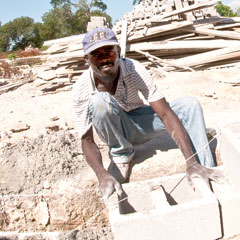
In 1983 Pope John Paul II put a scare into Haiti’s rulers. The pope stepped off his Alitalia plane and, disdaining the red carpet, the banquet and all the pomp Haiti’s royal household could muster, he kissed the ground and spoke directly to the people.
“Fok sa chanj!” he said in Creole from the airport tarmac. “Things here gotta change!” and the pope meant it.
Jean-Claude Duvalier and the ruling class would soon be gone, but things didn’t really change. The misrule of Haiti continued through two successful coups, several parodies of democratic elections, a U.S. invasion and an attempt at civil order by UN peacekeepers. Jean-Bertrand Aristide, the hope of the poor, ended his first presidency ruling by decree. His second presidency was spent blaming others for failures and funneling money to Washington lobbyists.
By the end of 2009, Haitians were still saying things had to change. But even an International Monetary Fund decision to cancel $1.2 billion in Haitian debt seemed unlikely to change anything.
Are the deaths of 230,000 Haitians in a magnitude 7.0 earthquake an opportunity for change? Is Haiti ready for a new beginning with its capital city reduced to rubble?
By March last year international donors had pledged $5.3 billion for reconstruction. Hopeful talk about “refounding” Haiti became common. But at the end of 2010 there were still more than one-million residents of the capital city Port-au-Prince living in tents, cholera was racing through tent camps and the first round of elections had produced rioting.
“We are fighting to build a new Haiti, but it’s a very long process,” Jean-Baptiste Chavannes, leader of the 60,000-strong Mouvman Peyisan Papay (the Peasant Movement of Papay), told The Catholic Register.
More than anything the political culture of Haiti has to change. A winner-take-all version of political leadership, often accompanied by violence — whether it was the paramilitary Tonton Macoutes of the Duvalier regime or the FRAPH attaches of Roul Cedras’ military junta — has poisoned Haiti’s history, said Chavannes.
“The mentality of the Tonton Macoutes is to have money and to have power,” he said.
The mentality of Haiti’s next leaders has to be something different.
“We’re trying to change the old mentality. It’s more profound, deeper,” said Yolette Jeanty, co-ordinator of the women’s rights organization Kay Famn.
“It’s not only building things.”
There was a spark of hope, an indication things could change, in the aftermath of the earthquake, said Jeanty.
“Right after the earthquake, people felt the need to come together,” she said. “There was an opportunity to have Haitians sit together and rethink, but leaders haven’t brought people together.”
A lack of leadership has squandered a precious moment when Haitians stood by one another, dug through the rubble together and shared what they had, said Jeanty. “It was an opportunity,” she said.
While outsiders often see Haiti as a violent and deeply divided society, the solidarity which broke out after the earthquake did not surprise Redemptorist Father Adonai Jean-Juste.
“Charity and love, it is a human value — not only for the rebuilding of Haiti,” he said.
But Jean-Juste also regrets how the sense of common purpose and shared destiny which arose from the earthquake has dissipated.
“We have to work hard to build a new Haiti. It won’t be given to us,” he said. “I believe in a new Haiti — maybe not next year, but we will make it.”
The most essential resource for a new, refounded Haiti is the determined, stubborn hope of ordinary Haitians, said Caritas Haiti spokeswoman Ridana Cornet.
“People from abroad are often surprised by the ability of people in Haiti to keep on,” she said. “Two days after the quake people were out and trying. There’s always the hope that things will get better.”
“The challenge for the many countries and organizations that are willing to help Haiti is to understand that they need to work with the Haitians and not dictate the way things need to change and improve,” said Dr. Peter Kelly, an American who has volunteered for many years in Haiti and helps run the Crudem Foundation’s Sacre Coeur Hospital in Milot.
If Haiti is going to be refounded, the important questions are “How and by whom and for what purpose?” said Haitian expatriate Guerda Nicolas.
Nicolas is outgoing president of the Haitian Studies Association and a professor of psychology at the University of Miami. She has been back in Haiti every month since the earthquake, working on development projects and taking part in official planning.
“I am very hopeful that the Haitian people are very, very strong and very, very resilient,” she said.
There is a role for Haitian ex-patriates, a role for people and nations of good will and a role for the Church in refounding Haiti, said Nicolas. “If you really want to get Haitians moving there are only two things you have to say to them. One is Church, Nicholas said.
“It’s really having an opportunity to connect with their priests and pastors, to hear from their priests and pastors. That has a lot of meaning for them. The second is to talk to them about how to get an education for their kids. Those two things will get Haitians coming out for any meeting.”
- RAISING UP HAITI -
a Catholic Register special report
Haiti's churches need healing [slideshow]
What now in Haiti?
Post-traumatic stress proves difficult
Catholic aid organizations fly under the radar
Canadian engineer to oversee Haiti’s Church rebuild
Haiti must take this opportunity to change
Crisis makes D&P rethink how it operates
Bold education plan held up by a lack of funds
Church holds community together
D&P-funded program provides pro-life solution to Haiti's sexual violence
Haitians must look to themselves to rebuild their nation
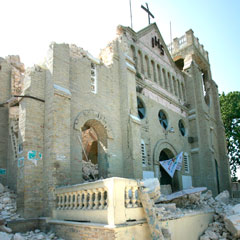 The huge task of rebuilding the Catholic Church in Haiti will be led by a Canadian civil engineer and project manager who will oversee the first $100 million in construction over the next three years.
The huge task of rebuilding the Catholic Church in Haiti will be led by a Canadian civil engineer and project manager who will oversee the first $100 million in construction over the next three years.
Yves Lacourciere from Quebec will take over PROCHE, an initiative of the Haitian bishops to rebuild churches, hospitals, schools, a university and a seminary destroyed last Jan. 12 in the devastating earthquake that killed 230,000 people. PROCHE stands for Proximite Catholique avec Haiti et son Eglise or “Catholic nearness to Haiti and its Church.”
Lacourciere was to start the project with a four-day meeting with five Haitian bishops Jan. 7 to 10. The meetings are expected to end with an announcement of rebuilding priorities and broad timelines on Jan. 12, the anniversary of the earthquake.
“If the goal is to give hope to people in the country, to me it will be that we need to have an action spread throughout the country,” Lacourciere told The Catholic Register.
The earthquake destroyed 70 parishes, including the Cathedral of Our Lady of the Assumption in Port-au-Prince, dozens of schools, several convents and the national seminary, reported Catholic News Service. Three Port-au-Prince archdiocesan leaders —Archbishop Joseph Serge Miot, Msgr. Charles Benoit, vicar general, and Fr. Arnoux Chery, chancellor — died in the quake along with seven priests, 31 seminarians and 31 men and women religious.
Among the possible priorities for the rebuilding program will be building skills for development among Haitian workers, promoting women through employment in the project, drawing communities together by reconstituting churches, strengthening the bonds between the Catholic Church and Haitian society by repairing the hospital, university and other service institutions and reinforcing the Haitian church by rebuilding the college and major seminary.
Lacourciere estimates the total rebuilding effort will last 10 years and cost in the neighbourhood of $300 million.
The Quebec engineer with a masters in administration and a PhD in technology, estimates he has been in Haiti 20 to 25 times between the late 1970s and mid-1990s overseeing building projects. He has also worked in the Dominican Republic — the other half of the island of Hispaniola — and Qatar. Following the civil war in Yugoslavia, Lacourciere oversaw engineering and business start-ups in Kosovo between 2000 and 2004.
“I am not a specialist. I am a generalist,” said Lacourciere.
Being a native French speaker who can communicate directly with Haitian bishops and international diplomats will be an advantage on the job, he said.
“I’ve always worked on big jobs,” said Lacourciere. “But what I like with this job is that I can use a lot of experiences I have had in the past. I am more than 60 years old. So, what I want is that what I will do is not for the money. It’s for help. I’m sure that there (in Haiti) I will be able to help.”

